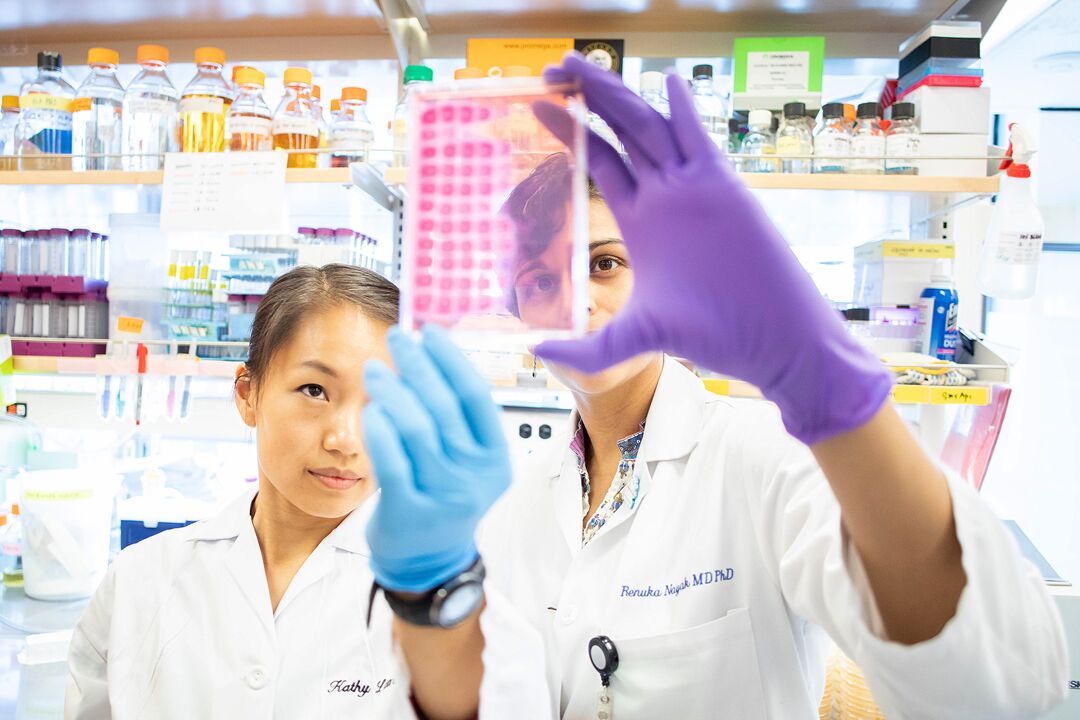
The UCSF Pediatric Rheumatology research program aims to advance our understanding of complex rheumatic diseases and to improve outcomes for affected children. Our researchers are involved in:
-
Understanding the underlying basic mechanisms of autoimmunity and immune dysregulation
-
Determining the best treatments for children with lupus, juvenile arthritis, and juvenile dermatomyositis
-
Helping teens and young adults transition to adult providers
-
Elucidating the contribution of social determinants of health to childhood rheumatic disease outcomes and developing strategies for addressing health inequities
We actively participate in the Childhood Arthritis and Rheumatology Research Alliance (CARRA), our national research network, which provides our patients opportunities to participate in national, multi-center registries and therapeutic trials.
Faculty Research
The division participates in a large variety of basic science, translational, and clinical research. Our team participates in research studies geared towards identifying novel markers of disease activity, determining better treatments, and understanding societal effects on patient care. We strive to continually advance knowledge and provide the best level of care.
Please refer to our Faculty page for further information about our faculty members’ research interests.
Research Staff
Zilan Zheng
Clinical Research Coordinator
Email: [email protected]
Phone: 415-353-1301
Clinical Research Opportunities for Patients and Families
Thank you to our patients and families interested in research! Please contact the research staff listed above if you are interested in any of the studies. Some of our studies support travel and/or lodging.
|
Study Title |
Participants |
Type of Study |
|
Diagnoses of JIA, JDM, SLE and related (MCTD, Sjogren’s, and more) |
Observational - surveys, biosamples (if eligible) |
|
|
Diagnosis of JDM, SLE and related OR Healthy control participants |
Observational – surveys, biosamples |
|
|
Sociological JIA (J-SOAR) |
Age 10 to 21 diagnosed with JIA and their parents/guardians |
Observational – surveys, interview |
|
Pediatric Automated Neuropsychological Assessment Metrics (PedANAM) Study |
Diagnosis of SLE within 2 years and enrolled into the CARRA Registry |
Observational – cognitive test |
|
A Study to Evaluate the Efficacy, Safety, and Pharmacokinetics of Obinutuzumab (POSTERITY) |
Age 5 to 11 diagnosed with SLE and Class III or IV Lupus Nephritis |
Interventional drug: Obinutuzumab |
|
The Pediatric Lupus Nephritis Mycophenolate Mofetil (PLUMM) Study |
Age 8 to 21 diagnosed with SLE and Class III or IV Lupus Nephritis |
Interventional randomized dosing of Mycophenolate Mofetil: Precision-Dosing vs SOC |
|
A Study of Rapcabtagene Autoleucel in SLE Patients with Active, Refractory Lupus Nephritis (LN) |
Age 18 and up diagnosed with SLE and lupus nephritis |
Interventional therapy: CAR-T |
|
A Study of Rapcabtagene Autoleucel in Patients with Diffuse Cutaneous Systemic Sclerosis |
Age 18 and up diagnosed with severe refractory diffuse cutaneous systemic sclerosis (dcSSc) |
Interventional randomized therapy: CAR-T vs Rituximab |
|
RESET-Myositis: A study of CABA-201 in Patients with Idiopathic Inflammatory Myopathy |
Age 6 and up diagnosed with idiopathic inflammatory myopathy such as juvenile dermatomyositis |
Interventional therapy: CABA-201 |
Acronyms: CAR-T = Chimeric Antigen Receptor T-cell therapy, JDM = Juvenile Dermatomyositis, JIA = Juvenile Idiopathic Arthritis, MCTD = Mixed Connective Tissue Disease, SLE = Systemic Lupus Erythematosus, SOC = Standard of Care
Research Resources
